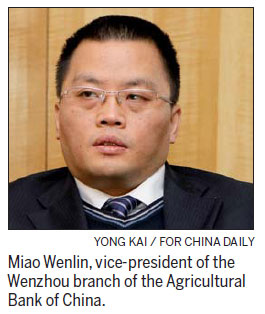Credit crunch
Updated: 2012-01-06 08:53
By Andrew Moody and Hu Haiyan (China Daily)
|
||||||||
 |
"One of the major problems is that those in traditional manufacturing businesses have diversified into other areas such as real estate and high-tech businesses. All these sectors need long-term finance but all they can get is short term and high interest funding, which is why their cash flow is so damaged," he says.
The Chinese government has recognized the seriousness of the problem. Following a visit to the city by Premier Wen Jiabao in October, the State Council (China's cabinet) introduced a number of measures.
These included lowering the reserve requirement ratio specifically for small business lending so banks can lend more.
Other measures included tax concessions, including raising thresholds for when businesses have to pay various corporate and business taxes, and stamp duty relief.
The government said it would also boost the scale of specialized funds available to small businesses.
Some, including the Wenzhou Small and Medium-sized Business Development and Promotion Association, doubt whether these measures will provide the longer-term solution to the financing difficulties of the small business sector.
"The policies and measures introduced so far are to eradicate the crisis. What we need are more long-term reforms in terms of the structure of finance, taxation, investment, the availability of funding and a better administrative environment for small businesses," adds Zhou.
One of the big questions is how far the problems experienced in Wenzhou are indicative of a generalized funding crisis in China as a result of the government's credit-tightening policies.
Certainly, there are reports of problems in other entrepreneurial centers such as in Ordos in the Inner Mongolia autonomous region and Xiamen in Fujian province.
Joe Fuller, founder and chief executive of the Monitor Group, the global management consultancy, is one who believes it could put a brake on China's juggernaut economic growth.
"The absence of legitimate or regulated private lending to small- and medium-sized companies is a big threat to China's future growth," he said at the 10th China Entrepreneur Summit held by the China Entrepreneur magazine in late December.
"If the SMEs cannot get financing to develop their business, the growth will be damaged."
Simon Eckersley, founder and CEO of Hao Capital, a private equity company with offices in Beijing and Hong Kong, says, however, it is wrong to see Wenzhou's problems as being unique.
He cites the problems that Western SMEs currently have in getting loans from European and American banks still trying to restore their balance sheets in the aftermath of the economic crisis.
"I don't think it is a reflection of a broader problem of the Chinese economy because you also have it in Japan and in the UK," he says.
He says if businesses cannot demonstrate their competitiveness in any market at present, they are going to find it difficult to get money.
"This is the case in every country and every region. China's growth is maintaining its momentum, and the credit crisis in one region cannot reflect the whole picture."
What separates Wenzhou and China from many other countries is the level of non-bank private lending in the economy.
According to estimates by China's central bank, such lending could represent 4 trillion yuan ($632 billion, 487 billion euros) or 8 percent of all formal lending in the economy.
Much of this is dominated by people from Wenzhou. According to the forecasting organization IHS Global Insight, they have some 800 billion yuan of capital to issue as loans.
This sector is largely unregulated, consisting of consortia of small business owners and also private individuals sometimes lending to private individuals.
For many lending money at above-normal interest rates is a better investment than investing in equities or other financial schemes.
Over tea in the lobby of the Olympic Hotel in Minhang Road, Hu Zhenhua, professor of economics at Wenzhou University, paints a picture of the precariousness of this informal loans system.
"The whole system is based on A lending to B and B lending to C lending to D etc," he says.
"If D, however, flees the country, you get this domino effect where the whole system collapses. It is a crisis and it is probably getting worse."

 Relief reaches isolated village
Relief reaches isolated village
 Rainfall poses new threats to quake-hit region
Rainfall poses new threats to quake-hit region
 Funerals begin for Boston bombing victims
Funerals begin for Boston bombing victims
 Quake takeaway from China's Air Force
Quake takeaway from China's Air Force
 Obama celebrates young inventors at science fair
Obama celebrates young inventors at science fair
 Earth Day marked around the world
Earth Day marked around the world
 Volunteer team helping students find sense of normalcy
Volunteer team helping students find sense of normalcy
 Ethnic groups quick to join rescue efforts
Ethnic groups quick to join rescue efforts
Most Viewed
Editor's Picks

|

|

|

|

|

|
Today's Top News
Chinese fleet drives out Japan's boats from Diaoyu
Health new priority for quake zone
Inspired by Guan, more Chinese pick up golf
Russia criticizes US reports on human rights
China, ROK criticize visits to shrine
Sino-US shared interests emphasized
China 'aims to share its dream with world'
Chinese president appoints 5 new ambassadors
US Weekly

|

|






